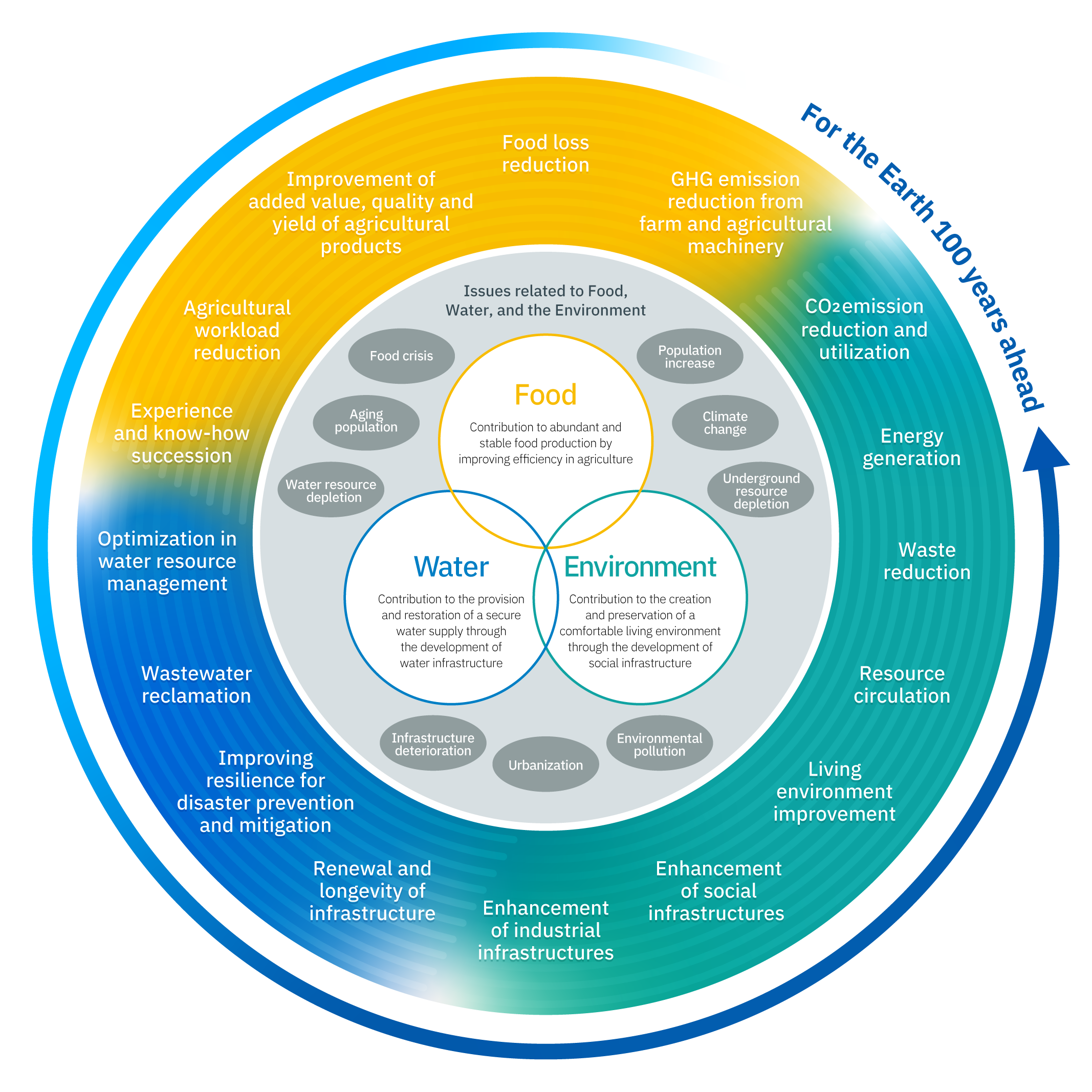Concept
“Food, Water, and the Environment”: global Bio-Loop Creation
A biosphere spiral that nurtures life from the local to global
We will explore the nature of global and local loops based on “food, water, and the environment” in various loops, such as productive activities and the global environment (environmental loop), natural and man-made products (resource loop), and securing lives of the producers while preserving the traditional values (economic loop), and aim to create a sustainable society through community building with diverse stakeholders and sustainable glocal bio-loop creation.

(1) Food: Contributing to abundant and stable food supply through more efficient agriculture
In the face of global food shortages and the growing problem of food loss, we aim to create a “food bio-loop”, a new food production, distribution, and consumption cycle system, by combining the DX/GX (the digital transformation/green transformation) technologies that are the focus of the UTokyo Compass, biotechnology and Kubota’s smart technologies in agriculture.
(2) Water: Contributing to secure water supply and reclamation through the development of water infrastructure
There are communities facing problems with water resources that are essential to their daily lives due to increasing water demand from population growth, pollution of rivers and oceans, and other factors. By integrating cutting-edge water-related technologies and research of Kubota and the University of Tokyo, we aim to create a “water bio-loop”, a new water cycle system that is friendly to the biosphere, by working towards safe and secure water supply/reclamation.
(3) Environment: Contributing to creation and preservation of a comfortable living environment through the development of social infrastructure
The agriculture, forestry, and fisheries industries account for 1/4 of the world’s greenhouse gas emissions, making it an extremely important sector for achieving a carbon neutral society by 2050. Through the collaboration between Kubota and the University of Tokyo, we will work to utilize and to reduce emissions and greenhouse gases such as carbon dioxide and methane, achieving to shift resources from disposable to recyclable. We will also aim to create an “environmental bio-loop” that is sustainable, does not burden the biosphere, and enables both comfortable living and environmental conservation for our future generations.
Achieving a better future society together with the promotion of the medium- and long-term visions of both Kubota and the University of Tokyo
This collaborative project will combine the University of Tokyo’s strengths in academic research, such as clarification and modeling of phenomena related to ecosystems and material cycles, with Kubota’s strengths in practical research and technology development in the fields of food, water, and the environment directly related to human life, such as sensing, data analysis, forecasting technologies to acquire various data, machine design, and control technologies to take actions based on visualized data. Through these efforts, we aim to create a bio-loop of “food, water, and the environment” and to propose solutions that comprehensively link each of these areas.
Significance as the University of Tokyo
Based on the vision of “UTokyo Compass – Into a Sea of Diversity: A Creating the Future through Dialogue”, we aim to resolve social issues in cooperation with various stakeholders by creating a mutual interrelation of dialogue and trust. We expect the University of Tokyo, which has abundant experience in education and research in bioeconomy and circular economy necessary to realize a recycling-oriented society, to promote the collaborative project to include real-world perspectives and viewpoints with Kubota Corporation, which is involved in various businesses related to food, water, and the environment, with the aim of becoming a “life-supporting platformer” in society.
Significance as Kubota Corporation
Based on the long-term vision “GMB2030”, we aim to provide solutions as a “life-supporting platformer”, through “improvement of food productivity and safety”, “promotion of water resources and waste recycling”, and “improvement of urban and living environments”.
Since its establishment in 1890, Kubota has been engaged in solving various social issues related to food, water, and the environment. We expect that the addition of the University of Tokyo’s diverse and outstanding academic expertise will promote the strengthening of basic research and R&D from a long-term perspective, as well as the development of human resources through the exchange of excellent personnel.
Collaborative projects through corporate partnership
Future vision study

- Exploring the Earth 100 years from now to achieve the creation of a “glocal bio-loop”.
- Resolving social issues in cooperation with various stakeholders.
Conducting collaborative research

- Executing research that incorporates the viewpoints and perspectives of the real society
- Strengthen basic research and promote R&D from a long-term perspective
Human resource development

- Development of human resources who have a bird’s-eye view of the technologies, sociological and cultural aspects related to food, water, and the environment
- Recurrent education to promote exchange of human resources and social cooperation
